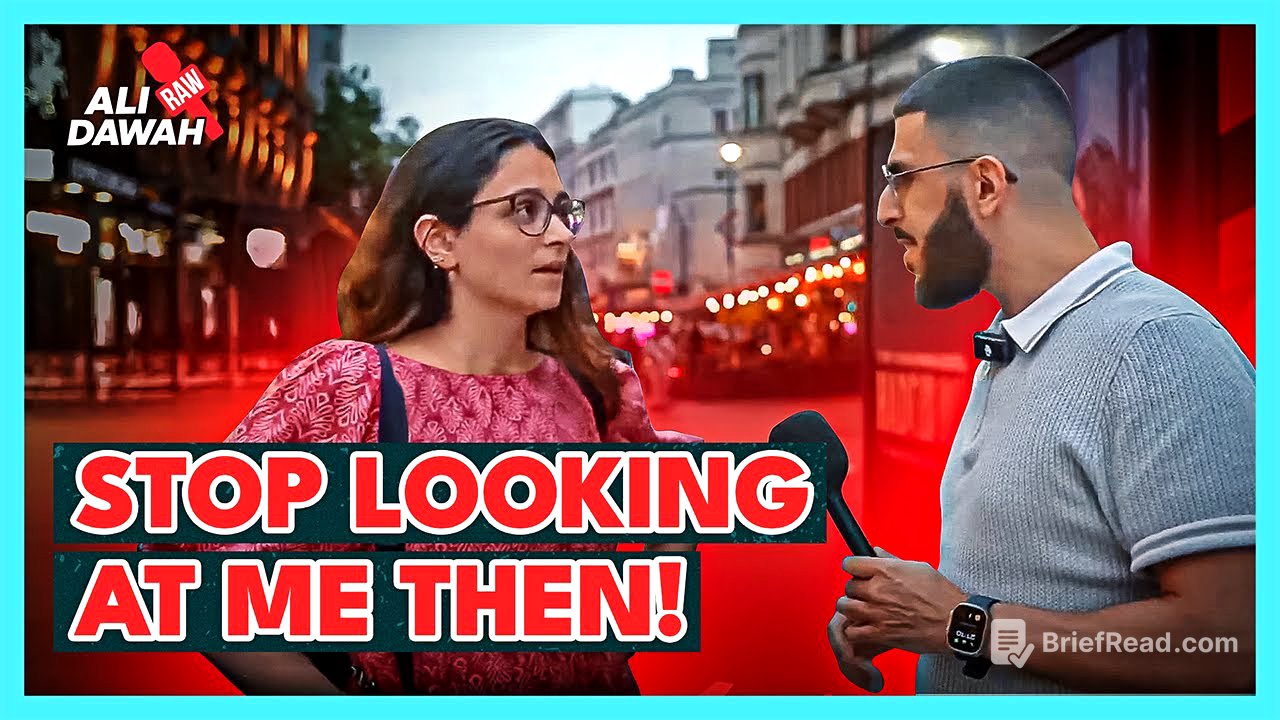TLDR;
This video features a conversation between Ali Dawah and a woman from Turkey who identifies as an atheist. The discussion centers on her views about Islam, particularly her belief that it is sexist and misogynistic due to requirements like women covering up. Ali Dawah counters her arguments by discussing the Islamic perspective on modesty, the objectification of women in Western society, and the rights and protections Islam provides to women. They also touch on the existence of God, the influence of society on personal choices, and the pragmatic nature of certain Islamic rulings.
- The woman expresses her view that Islam is sexist because of the requirement for women to cover up.
- Ali Dawah argues that Islam protects women's rights and that Western society objectifies women more.
- The conversation touches on the existence of God and whether personal choices are influenced by society or individual belief.
Introduction [0:02]
The video starts with an advertisement for sponsoring people to learn Salah during Ramadan, emphasizing the reward for teaching others to pray. The ad encourages viewers to donate, highlighting the Islamic belief that charity does not decrease wealth.
Initial Discussion on Islam and Misogyny [0:45]
Ali Dawah begins a conversation with a woman from Turkey who expresses her dislike for Islam, citing it as sexist and misogynistic. She argues that the requirement for women to cover up objectifies them and implies that men cannot control themselves. She questions why men are not taught to be decent instead.
Counterarguments on Objectification and Modesty [1:23]
Ali Dawah counters that Islam teaches men to lower their gaze and that the Western world sexually objectifies women more through practices like wearing makeup and striving for an ideal body image. He references a book called "Beauty Sick" to support his point. The woman argues that Western women are not promiscuous, but Ali Dawah suggests that Islam values women for more than their beauty and protects them from being judged solely on their appearance.
Islamic Perspective on Covering and Protection [5:15]
The discussion continues with the woman stating that requiring women to cover up sexualizes their bodies. Ali Dawah explains that Allah created men with a weakness for looking and women with a desire to look beautiful, so covering up is a test for women, while lowering the gaze is a test for men. He also suggests that a man's natural protectiveness over his wife is not a medieval atrocity but a sign of care.
Influence of Society and Personal Choice [6:42]
Ali Dawah argues that the woman's views are influenced by the Western system, while he is influenced by God. He states that people are influenced by movies, social media, and peer pressure. He contrasts this with Islam, where followers adhere to one master (God) and a consistent way of life, rather than constantly changing trends.
Rights and Protections for Women in Islam [13:24]
The conversation shifts to the rights and protections Islam provides to women. Ali Dawah explains that Islam protects women's hearts and souls by setting protocols for marriage, such as speaking to the woman's father and paying a dower (mahr). He emphasizes that Islam gives women rights and security, and men have a duty to provide and protect for their wives.
Testimony and Pragmatism in Islam [18:33]
The woman questions why a man's testimony is equal to two women's testimony under Sharia law. Ali Dawah explains that in certain circumstances, such as business dealings, women may not be as involved or knowledgeable, so two witnesses are required. He clarifies that this is not a generalization but a pragmatic approach that considers the realities of different situations.
Concluding Remarks and Invitation [23:30]
As the woman has to leave, Ali Dawah encourages her to read the Quran and consider the arguments presented. He emphasizes that everyone has a designer (God) and invites her to return for future discussions. Despite her atheism, Ali Dawah respects her opinion and continues to engage with her respectfully.









